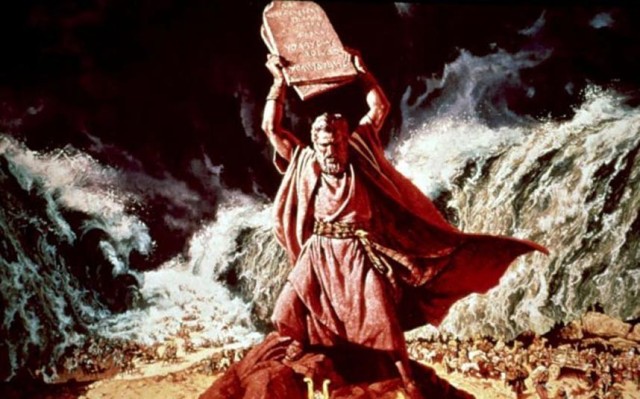
by Michael Maciel
I am the Lord your God, who brought you out of Egypt, out of the land of slavery. You shall have no other gods before me. – Exodus 20
This is the First Commandment, and boy is it a doozy! On the face of it, it sounds like a rallying cry for the new nation of Israel, a way for the Jewish people (and later, Christians) to separate themselves forever from the heathens. In one stroke, it sets up future holy wars and a subconscious fear of a jealous and wrathful God.
But let’s look at it differently. Let’s take it out of the context of space and time, and let’s strip it of all ethnic and religious connotations. Instead, let’s look at it, not as “the Law,” but as the Law of Mind—a veiled set of instructions on how to become a conscious co-creator with God.
The first sentence sets the tone: freedom. Obviously, the “Land of Egypt” means something symbolically, probably the lack of individuality implied in the word “slavery.” It’s a metaphor for being tied to the Wheel of Karma. What greater bondage is there than to be caught in the grip of the Law of Cause and Effect with no way to control it?
The Jewish People’s escape from Egypt is the first step towards the Western ideal of individualism. It makes possible the rights of the individual and the rule of law, setting the stage for each member of humanity to take personal responsibility for his or her own destiny. And to do that, there has to be an awakening to self—the recognition that each person is a living soul with a direct connection to the Almighty.
There’s only one way to escape from the Wheel of Karma, and that is to learn how to use the Laws of Creation. Because until you learn how to be a cause in the universe, you will forever be a slave to it. And the surest way to stay a slave is to remain asleep—to be a nameless face in the crowd going along with the flow, having no thought of your own, and having no sense of yourself as a free and independent agent.

The Ten Commandments introduce the notion that the universe runs according to law, not the law of a capricious dictator, but laws that are written in stone—laws that are interwoven into the fabric of reality. In a sense, the Ten Commandments not only make possible the rights of individuals, they also form the basis of modern science, because modern science also says that the universe is governed by law. Do this, and that happens.
There are two key concepts in the first sentence: one is that God is a savior and is, therefore, a God of love interested in our freedom, and two, that God is a personal God, that the universe is alive, conscious, and self-directing. After all, something called “God” is calling itself “I.” And it’s talking to a “you.” So the context is hugely significant. We are IN the universe and not merely on it or of it. Our relationship to the universe (to God) is just that: a relationship. We’re not balls being bashed around on some cosmic billiards table.
So, if the theme of this set of instructions centers around the idea of individuality, what is it that makes us most individual? What makes a person stand out from the crowd? Is it not self-determination? If it is self-determination, what is the key factor in that? It is, I think most would agree, integrity—being true to oneself, to your beliefs, to what you know to be true, and most of all to the goal you have set for yourself in this life. Integrity is to a human being what the cell membrane is to a living cell.

For all intents and purposes, these things I have enumerated are God, as far as we’re concerned. They are our highest conceptions of reality, are they not?—our Highest Good. You could even say, in the most realistic sense, that we worship them. Or at least, according to the First Commandment, we should.
The wisest people in the world pretty much agree on one thing: there is no greater power than a disciplined mind focused on a single idea. Is it any surprise then that a divine set of instructions on the laws of creativity would begin with that one all-important principle—focus.
What is it that you want? What do you want to create? What is it that you are asking the universe to deliver? Whatever it is, whatever vision you have, whatever ardent desire you hold in your heart, wouldn’t it be better if there was nothing competing with it?
Now, I know that some people might see this as a stretch, just an attempt to force an interpretation on traditional teachings. But I think you will see that as we go through the remaining nine Commandments that there is an unmistakable pattern at work here. What most people see as a set of rules I see as a set of instructions. And if you want to test my theory, please do.
My interpretation might not be the only way to see this, but it is certainly a way. God isn’t telling us what we can’t do but what we can. The Ten Commandments are a means to lift us up, not keep us down. And I think that this is closer to the truth and that it was hidden in plain view by Moses as he taught his people how to behave as a people and his Priesthood how to function as priests.
You be the judge.
See also:
The Second Commandment—is it really about worshipping idols?
The Third Commandment—get over yourself!
The Fourth Commandment—do I really have to go to church?
The Fifth Commandment—my mother, drunk or sober
The Sixth Commandment—Thou Shalt Not Kill Bill
Scrambled Eggs—Thou Shalt Not Commit Adultery
Books by Michael Maciel
World Priest—Bringing Heaven to Earth
The Five Vows—Raising Your Spiritual Commitment to the Next Level

Do you think the Wheel of Karma is really something Christians have to be concerned about? That dreary and depressing bit of Hinduism?
Thank you Michael. A brilliant analysis.
Bruce
Bruce McCausland brucehmcc@aol.com
Love your interpretation. I for one have always been at odds about the traditional approach to Christianity and all of its interpretations. The Laws of the Universe are universal not favouring anyone from any particular religion as much as people would love to believe it. So, yes, this makes perfect sense and resonates with my thinking. Thank you Michael.